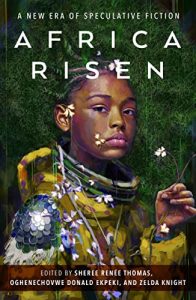Isiah Lavender III Reviews Africa Risen: A New Era of Speculative Fiction edited by Sheree Renée Thomas, Oghenechovwe Donald Ekpeki, & Zelda Knight
 Africa Risen: A New Era of Speculative Fiction, Sheree Renée Thomas, Oghenechovwe Donald Ekpeki, & Zelda Knight, eds. (Tordotcom 9781250833006, $27.99, 528pp, hc) November 2022. Cover by Manzi Jackson.
Africa Risen: A New Era of Speculative Fiction, Sheree Renée Thomas, Oghenechovwe Donald Ekpeki, & Zelda Knight, eds. (Tordotcom 9781250833006, $27.99, 528pp, hc) November 2022. Cover by Manzi Jackson.
In Africa Risen: A New Era of Speculative Fiction, Sheree Renée Thomas, Oghenechovwe Donald Ekpeki, and Zelda Knight magnificently produce what I see as the successor to Thomas’s groundbreaking and award-winning Dark Matter anthologies. Dark Matter: A Century of Speculative Fiction from the African Diaspora and Dark Matter: Reading the Bones showcase the creative brilliance of Black speculative fiction writers largely from the US. These two anthologies, along with Nalo Hopkinson’s Whispers from the Cotton Tree Root: Caribbean Fabulist Fiction, signaled the beginning of the colored wave of speculative fiction that has been continuously expanding since that foundational moment. Indigenous, Latinx, and Asian writers, among others, have produced wonderful anthologies of their own. Accordingly, the African continent plays a leading role in this ongoing wave with Ivor W. Hartmann’s three AfroSF collections, Nerine Dorman’s Terra Incognita: New Short Speculative Stories from Africa, Ekpeki and Knight’s Dominion: An Anthology of Speculative Fiction from Africa and the African Diaspora, Wole Talabi’s Africanfuturism: An Anthology, and Ekpeki’s The Year’s Best African Speculative Fiction. These are only the ones I already know about and own in my personal collection. Unsurprisingly, a body of race criticism, largely focused on science fiction, has also emerged, advancing various theories, ideas, and directions for engaging racial constructs such as afrofuturism, africanfuturism, Pan-African science fiction, black quantum futurism, afrotopia, etc. But I find it impossible to categorize Africa Risen for fear of potentially limiting its audience.
I have no doubt that Africa Risen will be every bit as important a collection as the Dark Matter anthologies. Here’s why: it’s got virtual reality; it’s got robots; it’s got dragons; it’s got shapeshifters; it’s got time travelers. My goodness, it’s also got lizard people. It’s got climate change. It’s got cool visions of technology as well as critiques of capitalism. It appraises race and racism, gender and queerness, and religion too. It challenges its audience through stories of rituals, initiations, and spiritual beliefs. It’s got star gazing, hover buses, underwater adventures, hauntings, love affairs, magic and science in equal measure. By golly, it even has a story featuring a spaceship named Biscuit. I could not put the book down. It’s got everything in 32 stories by both famed and unknown writers, comprising 495 pages, deriving from the African continent and its diaspora. Africa Risen is simply a gorgeous anthology and it’s well worth the wait.
Naturally, the well-known and veteran writers such as Steven Barnes, Maurice Broaddus, Tobias S. Buckell, and Tananarive Due bring the funk. How could they not? In “IRL,” Barnes’s protagonist Shango/Garrett escapes daily into a virtual world, drifting away from his father as they mourn the loss of his mother. Shango unwisely takes on a virtual enemy, who creates a simulated game that mirrors a real-world crime and pins it on Shango’s father. Ultimately, Shango burns all of his virtual capital to save his father’s life in the real world. In Broaddus’s “Ruler of the Rear Guard,” Sylvonne Butcher, a young black woman, quits America for Ghana under a new Pan-African Law. Buckell’s “The Sugar Mill” features ancestral spirits that prevent a light-skinned man from selling his inheritance to real-estate speculators after a hurricane because many of his enslaved forebears died at the sugar mill on the land. And Due’s “Ghost Ship” presents an African girl, named Florida, who’s boss books her passage to the United States on an ocean liner. Florida carries an illegal package, a bio-engineered cat she names Burden that eventually escapes from the room after a power fluctuation and perhaps causes a disease outbreak that kills everyone onboard except Florida. As I said earlier, these provocative stories deliver on the thrilling introspections I expect from established pros.
But I’m much more interested in highlighting the new talent, that is new to me talent. To my way of thinking, the lifeblood of speculative fiction has always depended on its short stories to allow its audience to discover new authors and to allow those authors to develop their talent before moving on to longer form writing. American Russell Nichols creates a fascinating climate fiction story in “Mami Wataworks,” where an event known as the Filth causes a long-lasting global drought and a young girl named Amaya invents a device to harvest water from tears after losing faith in the great rain long ago predicted by the village (weather) forecaster. Trinidadian Canadian Franka Zeph’s “Door Crashers” features stolen time-travel technology, an elite military intelligence unit, human-passing automatons known as melanoids, a desperate attempt to save the world, and betrayal. Motswanan Tlotlo Tsamaase’s “Peeling Time (Deluxe Edition)” concerns an oppressive rap song created by a failed rapper named Motsumi, who makes a Faustian deal with his own trauma by using muthi-tech, a kind of computer software that changes reality. Motsumi traps the spirits of 129 women to achieve wealth and fame with his song and video until he takes on the wrong woman in Sewela. The story’s title refers to the 17-song album she makes from wearing Motsumi’s skin. “The Lady of the Yellow-Painted Library”, by Nigerian Tobi Ogundiran, describes the failure of travelling salesman Wande Badmus to return the overdue Things Fall Apart. Somehow a unibrowed librarian tracks him from city to city and Wande meets a tragic fate, death by the lizard people who’d been wearing the librarian’s skin. As it turns out, Wande’s partner Donatus picked up the book at one of their stops, and the cycle begins again. Mame Bougouma Diene & Woppa Diallo’s story “A Soul of Small Places” involves a teenaged Sengalese girl named Woppa who becomes a man-eating djinn in response to nearly being raped along a river bank on the way back from school with her little sister.
Honestly, I would talk about every story if I had the space. For example, Nigerian Ada Nnadi’s “Hanfo Driver,” relates an instant attraction between Fidelis, the man hired by Oga Dayo to drive the first hover bus in Lagos, and Dayo’s mechanic nephew, Timi, who comes to fix the hover bus after it breaks down on its first day in service. But I simply don’t have the space to match my inclination to talk about Wole Talabi’s “A Dream of Electric Mothers” or Chinelo Onwualu’s “The Taloned Beast” or Dare Segun Falowo’s “Biscuit & Milk” or any of the others. This collection truly contains outstanding stories. I won’t be shocked when Africa Risen picks up a variety of awards in the near future. To end with a bit of vernacular – Africa done rose and den some!
Isiah Lavender III is a professor of English, sometime runner, father of 2 rambunctious boys, married to the most beautiful woman in the world, & LFC fan. Isiah can be found @3Isiah
This review and more like it in the November 2022 issue of Locus.
 While you are here, please take a moment to support Locus with a one-time or recurring donation. We rely on reader donations to keep the magazine and site going, and would like to keep the site paywall free, but WE NEED YOUR FINANCIAL SUPPORT to continue quality coverage of the science fiction and fantasy field.
While you are here, please take a moment to support Locus with a one-time or recurring donation. We rely on reader donations to keep the magazine and site going, and would like to keep the site paywall free, but WE NEED YOUR FINANCIAL SUPPORT to continue quality coverage of the science fiction and fantasy field.
©Locus Magazine. Copyrighted material may not be republished without permission of LSFF.






